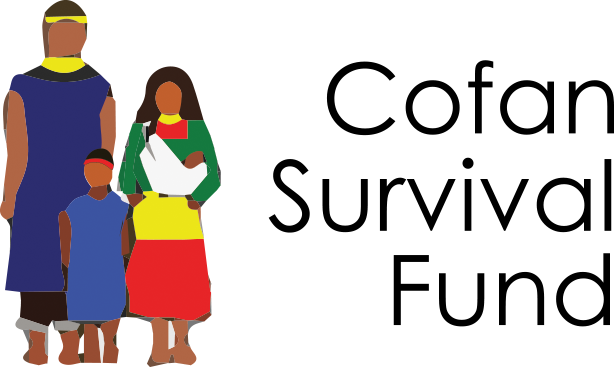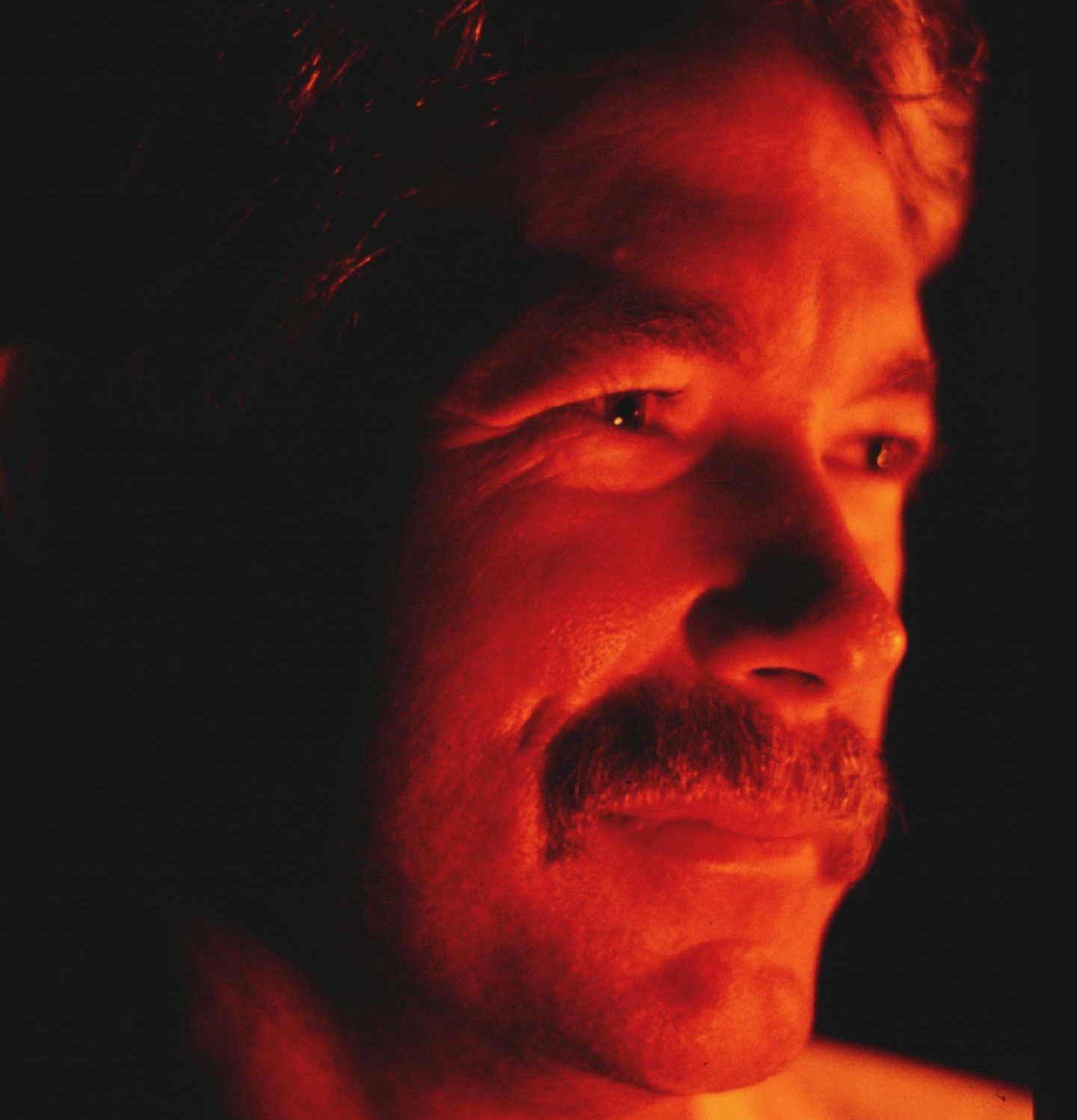Dear Cofan Survival Fund Supporters,
Despite months between newsletters, the Cofan Survival Fund (CSF) is alive and well! Each day, our Ecuadorian team continues and expands the work you’ve supported over the past two and a half decades: protecting the one-million-acre Cofan homeland, educating a new generation of Cofan leaders, and providing lifesaving medical care for members of the Cofan Nation.
Though CSF’s work has always been a collective effort, no one has been more important to it than Randy Borman, who is pictured above in his earlier years. Randy is founder of the CSF and Executive Director of our Ecuadorian counterpart, the Fundación Sobrevivencia Cofan. He is also one of the most celebrated Indigenous activists in Latin America. Cofan individuals and communities have elected him as their leader many times, first in the community of Dureno, then in Zábalo, and then as the President and Director of Territory of the Cofan ethnic federation. Over and over, the Cofan have relied on Randy to lead their fight for survival—and he continues to fight as hard as ever.
Randy’s battles for his people and their rainforest homeland, however, have taken a toll on his wellbeing. From the death threats of his early days fighting the oil industry to the kidnapping of his son Felipe during conflicts between the Cofan Park Guards and gold miners, Randy has had many reasons to give up, but he never has.
The costs to Randy’s body have been extreme; a life fighting for the forest comes at a steep price. 21 years ago, I was living with Randy in Quito when he suffered a near-fatal case of equine encephalitis. The fever raged for weeks, and Randy’s brain underwent severe trauma. With a destroyed pituitary gland, Randy has relied on hormone-replacement therapy ever since just to stay alive. The side effects are tough, but so is Randy.
Recently, the threats to Randy’s life have returned. A year ago, I wrote to let you know that Randy had suffered a heart attack. As always, he pulled through that health scare with grit and determination.
The last two months have been some of the hardest. Living on the equator and spending so much time on mountains and rivers and wetlands have damaged Randy’s skin. Years ago, doctors detected carcinoma (cancer) on Randy’s face, but they removed it before it spread. Two months ago, they discovered that the cancer had come back with a vengeance. Four carcinomas were deep and threatening to spread to other parts of Randy’s body. A week of surgeries and recuperation in the hospital put the cancer at bay. The cancerous flesh cut from Randy’s nose and ears left him looking like he’d been in a fight with a jaguar, but the scars are the perfect adornments for the kind of warrior Randy is.
Even though the cancer is gone, the experience put a great strain on Randy’s immune system. A month ago, he developed a urinary-tract infection that made it all the way into his kidneys. Then, his body went septic. So it was another week in the hospital so the doctors could keep him alive and get the infection under control. He survived the latest threat to his life just as he’s survived the others.
Many of you know Randy personally, which is why I wanted to give you this health report. I also wanted all of us to remember that Randy is an incredibly courageous and determined man. He did not ask for this life of service. Indeed, one of the great ironies of his life is that his battle for his people’s rainforest homeland has prevented him from enjoying it. Randy’s political work keeps him in cities and government offices, whereas what he’s always wanted is to fish, hunt, and tend his garden in Zábalo with his Cofan family and friends. Life in the forest is his true love.
I’ve never met a person as brave, determined, ethical, and selfless as Randy. When I poked my nose into his business in 2001 to start writing about the CSF for my dissertation in anthropology, Randy invited me to live with him and his family. He gave me total access to the organization’s records, reports, grant applications, and account books, and he let me tag along to all his meetings. He only made two demands. If I wanted to write about him and his work, he said, I had to learn the Cofan language A’ingae and spend at least a year in his home community of Zábalo to understand how other Cofan people feel about him, his leadership, and the CSF. The demands assured me of Randy’s honesty and authenticity. I can’t imagine many other leaders, Indigenous or not, making a similar offer.
Each of Randy’s brushes with death reminds me of all that he, the CSF, and the Cofan Nation have accomplished. No one thought the tiny “tribe” would survive the onslaught of the oil industry in the 1960’s, but they did. And then, often led directly by Randy, the Cofan went on to recuperate one million acres of their ancestral territory and to protect it more effectively than almost all other Indigenous Peoples—as well as Ecuador’s Ministry of Environment and National Park System. Many Cofan leaders have been essential to this story, but Randy has been the most important of them all.
You, our supporters, should rest assured that we’ve long been preparing for the day when Randy is no longer able to lead the fight. His son Felipe, armed with BA and MA degrees and fluency in English, Spanish, and A’ingae, is now managing most of our projects. CSF board member Hugo Lucitante, now working on his PhD in anthropology, will also be a key player in the future of the Cofan Nation. Gissela Yumbo received her BS in engineering with the support of our Cofan Higher Education Project, and she’s part of the Cofan team working to create a truly bicultural, high-quality curriculum for schools in Cofan communities. Raúl Queta, who received his MA in intercultural justice and the rights of nature with CSF support, is now working with Gissela through his position with Ecuador’s Ministry of Education. And there are many more Cofan youth ready to take over when Randy makes the decision to “retire.” Personally, though, I know that as long as he’s breathing, Randy will fight. It’s simply who he is.
Tomorrow is Thanksgiving in the United States. I wanted to write this newsletter to express my own incredible thankfulness for Randy and his invitation, offered three decades ago, to become part of his life and the Cofan struggle. Additionally, I’m thankful for the love and support of all my Cofan friends and collaborators. Finally, I’m very thankful for YOU. Without your aid, the Cofan Nation would be in a treacherous position; I hate to think what the oil companies, loggers, gold miners, narcotraffickers, and settlers would’ve done to Cofan people and territory without you.
All of you have played an essential role in the miraculous story of Cofan survival. With your continued support, the story will have many more chapters, each more affirming and hope-inspiring than the last. Few of us have put our lives on the line over and over again like Randy, but more than anyone else, he knows that none of his accomplishments would’ve been possible without you.
So please keep the support coming! Last year was one of the CSF’s most financially stable in a long time, but there’s so much more we could do if we had additional resources. Your contributions truly mean the difference between life and death for many Cofan people and all the beings that inhabit their homeland, the most biodiverse place on earth. Cofan land is also essential to all our futures given the increasingly dire climate crisis. If Cofan forests don’t continue to stand, we’ll all be in an extremely precarious position. Ultimately, Randy, the Cofan, and the CSF are fighting for the world’s survival, not just their own.
If you’d like to discuss a project, idea, or donation, feel free to write me directly at michael.cepek@utsa.edu so we can schedule a conversation. Right now, we have a particular interest in donors who can help fund our Cofan Higher Education Project. Jon Will and the Betty Louise Smith Fund have supported Cofan education for years, but their aid is coming to an end as they spend down their endowment. I’d be happy to speak to you about this need or anything else. I’m a big believer in the CSF: as a volunteer, I don’t just donate my time and energy to the CSF, I also donate my money. I’d like to tell you why that choice was one of the best ones I’ve ever made.
Sincerely,
Michael L. Cepek, CSF President
CSF is a 501(c)(3) non-profit organization, and donations are tax deductible to the fullest extent allowed by law. For gifts of $250 and larger, you will receive a receipt for tax purposes.

